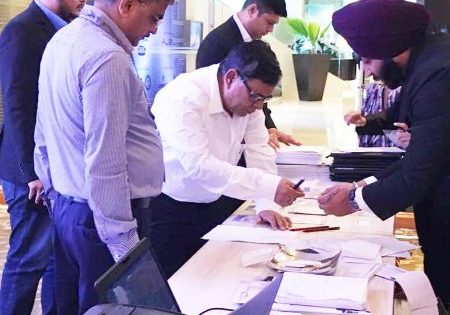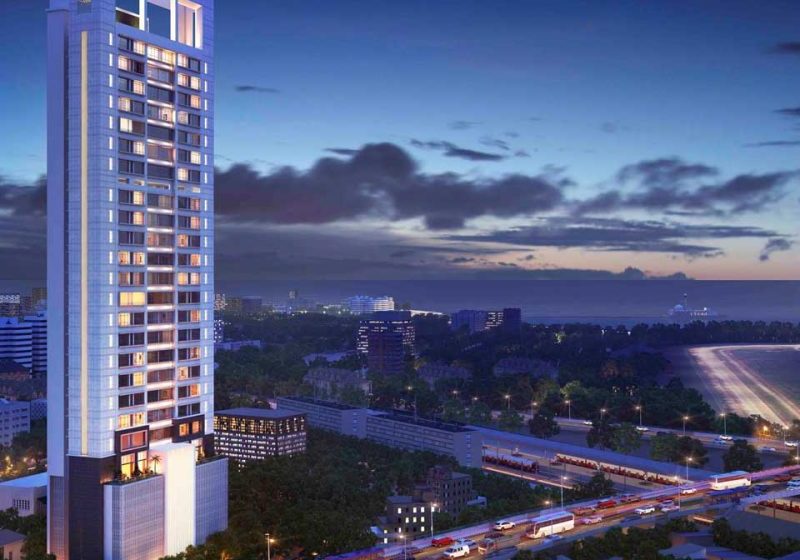Formula For Growth
Dec 1, 2019

Infrastructure projects have key role in success of Johnson Lifts.

With a comprehensive product range in elevators and escalators, Johnson Lifts Pvt. Ltd. has experienced exponential growth over the past 10 years. The company has provided infrastructure to public service projects across India and has done 12 metro projects, 27 airport projects and more than 800 elevators at railway stations, manufacturing more than 12,000 units annually. Apart from its presence in five other countries (Nepal, Sri Lanka, Tanzania, Dubai and Myanmar), Johnson covers India through 54 branches and 10,000 employees.
Executive Director V. Jagannathan noted the efforts Johnson has made to stand out among a crowded field:
“There has been significant growth in the opportunities available, owing to the major urban infrastructure development programs. The growing opportunities have attracted many multinational players, hence bringing in stiff competition in terms of excellence and efficiency. Johnson is proud to stand through this competition and yet be preferred.”
Director Yohan John pointed to the company’s growth over the past 10 years:
“In 2009, Johnson clocked sales turnover of INR4.2 billion (US$58.8 million) with 5,200 units; in 2019, we crossed INR20 billion (US$280.6 million) with 12,000-plus units being delivered, thereby ensuring a market-leading share of over 20%.”
From two factories in 2009, Johnson has expanded to four factories in 2019, with combined facilities that produce 16,000-plus lifts per annum, John said, adding:
“Foreseeing the growth in lift requirements and the need for heavy-duty escalators, a new, integrated, fully automated lift factory is now ready for production at a 140,000-m2 facility at Sengadu, Tamil Nadu. It will be able to produce an additional 6,000 lifts per annum. Also, an additional line for heavy-duty escalators has been installed at the Oragadum factory. This additional line will be able to produce 500 escalators per annum.”
The central government’s schemes on major urban infrastructure programs in India, like metro rail projects, UDAN (regional airport development and connectivity scheme) and the modernization of airports, railway stations, bus terminals and foot overbridges at important junctions has given rise to a great opportunity for heavy-duty escalators used in mass transportation systems in Mumbai, Navi Mumbai, Pune and Western Maharashtra, John said, adding:
“Johnson heavy-duty escalators have been running successfully in several suburban stations and other stations across Maharashtra for more than five years, and the design bears testimony to the continuous rugged usage of 20/7-hr, 365-day operation. Now, Johnson will also provide lifts and escalators for stations between Belapur and Pendhar, Dahisar to DN Nagar, Siddhi Vinayak to Cuffe Parade and Andheri East to Dahisar East of the metro rail project, comprising 287 escalators and 138 lifts valuing INR2.47 billion- (US$34.7 million)-plus. For Central Railway, Johnson will be providing 115 escalators and 129 lifts for the stations between central line CST Mumbai to Lonavala suburban, and for Western Railway, we will be providing 65 escalators valuing INR1.2 billion- (US$16.8 million)-plus.”
Over the past three years, the company has established additional service centers, introduced mobile service vans and implemented real-time smartphone service, thereby rendering timely quality service to customers. V. Sivakumar, general manager, Johnson Western Region, noted the advantages these developments have provided:
“This has helped Johnson expand its presence geographically in Maharashtra, and satellite offices have been set up in the Shridhi-Solapur-Kolhapur belt, due to the increased business from Tier 2 and Tier 3 cities. To cater to this market, Johnson launched competitive models to accommodate elevators in compact lift shaft sizes and machine-room-less elevators.”
Elaborating on the significance of escalators and elevators for metro projects in Mumbai, Jagannathan explained that Mumbai is a high-density city across 120 km, with people traveling across it from the suburbs. The existing rail lines stretch from the Western, Central, Khopoli and Harbor lines. With the construction of new metro lines — for example, Line 3, SEEPZ to Colaba underground corridor, Line 7 on WEH and Line 2A — elevators and escalators are provided in the stations for mass passenger transportation.
Because they must be able to handle heavy loads and usage, elevators and escalators in mass transit environments must be heavy duty. Facilities that serve mass transportation require fast, efficient movement of people, frequently through multiple levels. The demands in infrastructure projects are specialized and highly technical. They call for meeting international safety standards with high-end specifications, energy efficiency and reliability. Jagannathan, noting that Johnson is the only manufacturer of heavy-duty escalators in India, said that its 56 years in the country give it a market-leading position that enables it to sense demand and financial opportunities. This, he said, has fostered strong demand for Johnson in this segment.
Johnson: Processes and Procedures
Johnson Lifts Pvt. Ltd. says the following processes and procedures have helped ensure its position in the market:
Selection
The selection process is in three stages:
Prequalification: Evaluation is as per previous experience, organizational infrastructure, capability and past performance in similar projects.
Technical qualification: This is based on meeting the significant standards, tender requirements, meeting all specification parameters, tight completion schedules, organizational infrastructure capability and “Make in India” guidelines.
Commercial qualification: Based on the lowest-price bid.
Challenges
Elevated Stations
Require close coordination with various agencies, such as civil, electrical and system providers working together simultaneously during the project stage until completion
Require meeting safety and environmental standards in construction sites
Require meeting fixed project timelines without delay for better revenue operation
Underground Stations
In addition to the challenges faced in elevated stations, underground stations present unique problems:
Limited access and space availability for transporting heavy-duty escalators to installation locations
Glass elevators and escalators with glass balustrades are preferred, as they are found to give users more confidence and comfort.
Maintenance Efforts for Mumbai’s Climate
For its installations in Mumbai, Johnson provides a monthly preventive maintenance schedule with a predefined checklist and timely replacement of worn components to ensure trouble-free performance in the face of the city’s heavy traffic and monsoons.
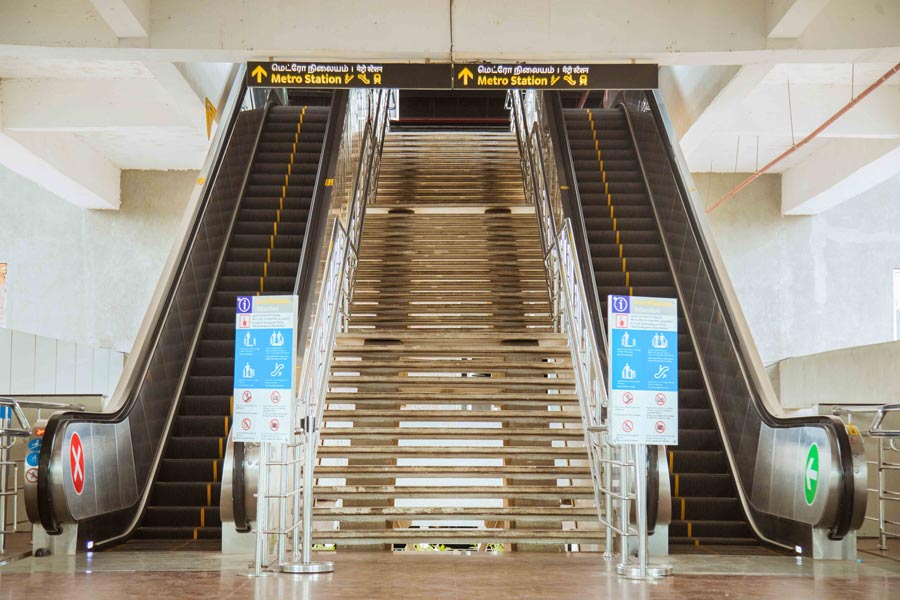
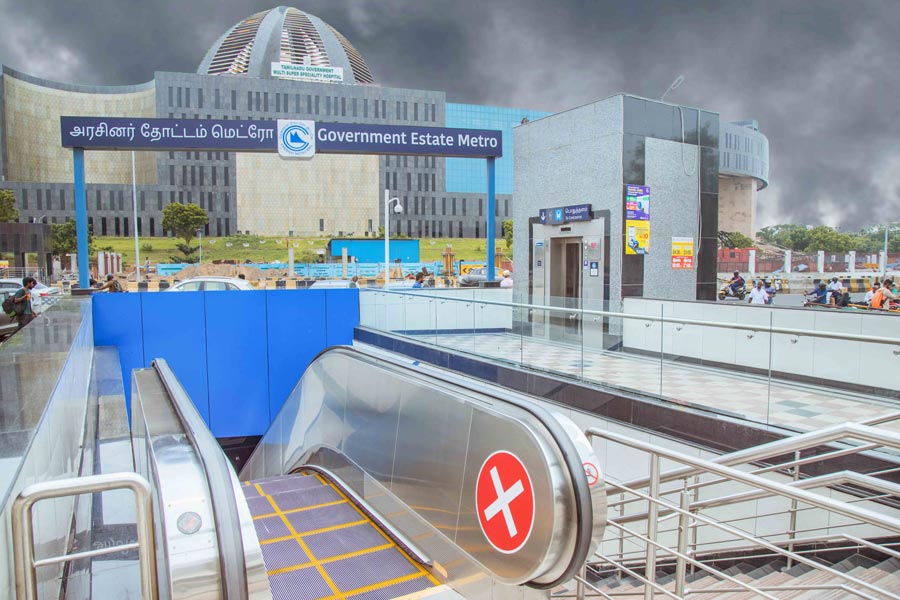
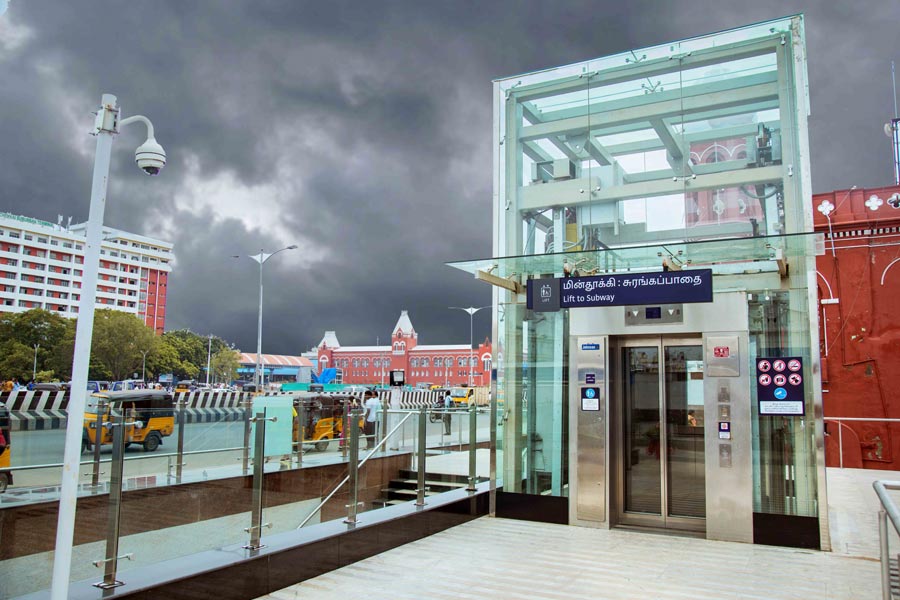
Get more of Elevator World. Sign up for our free e-newsletter.




